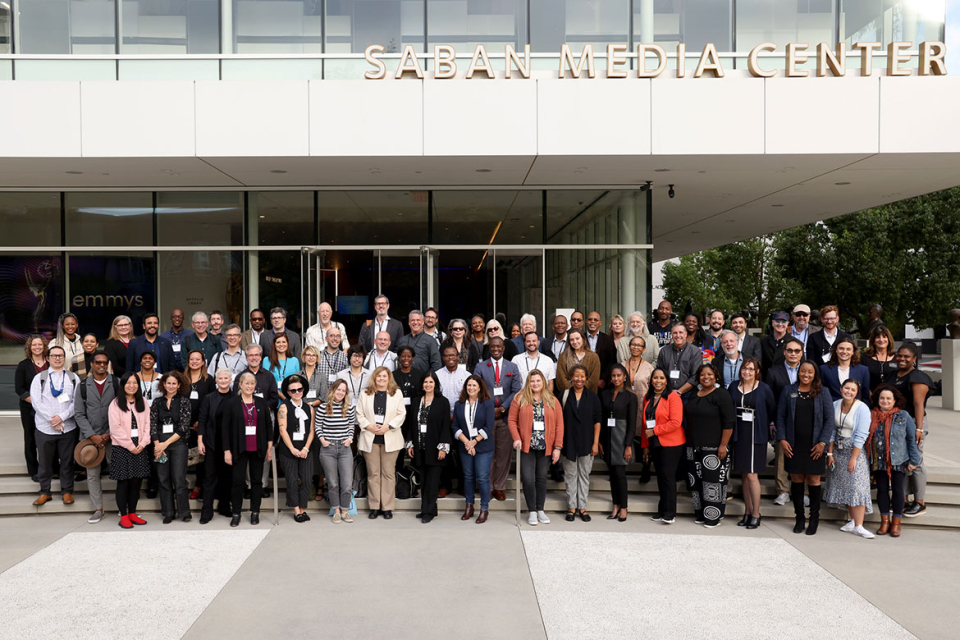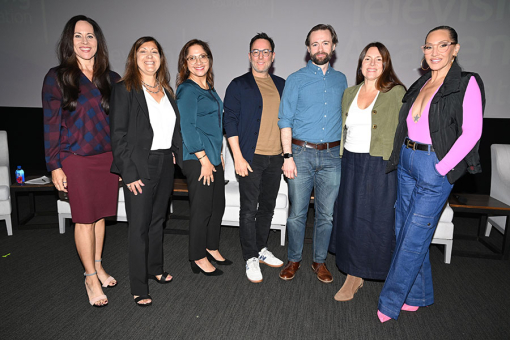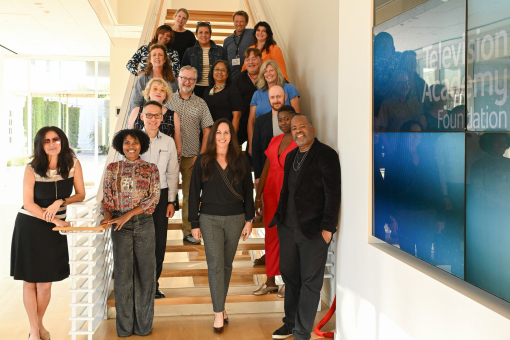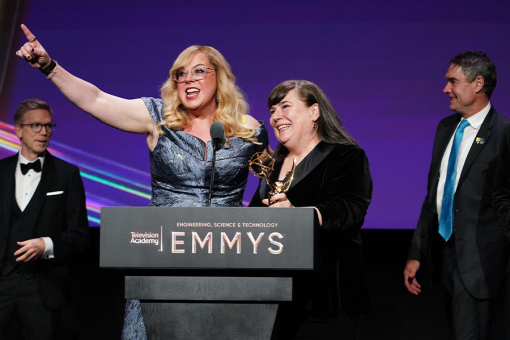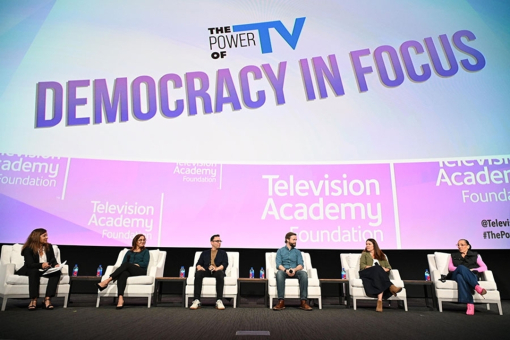When most productions were halted during the Covid-19 lockdown, one director of photography recruited his own telegenic family to appear with him in the commercials he was shooting.
That inspired bit of casting, but one example of the resourcefulness displayed by members of the television industry, was noted during the panel, "Production: The New Normal," the final program of the Television Academy Foundation's annual Media Educators Conference (formerly, the Faculty Seminar). Held October 27-29, the conference brought college and university professors from around the country to the Saban Media Center at Academy headquarters in the NoHo Arts District, where they gained an insider's view of the industry to impart to their students.
Four television veterans shared their experiences and insights about coping during Covid, when the industry collectively devised innovative work solutions that in some cases have remained post-lockdown. Panelists included Frank Scherma, chairman and CEO of the Academy and president of production company RadicalMedia; Carol Trussell, head of production, Apple; Ann Leslie Uzdavinis, Academy treasurer and an independent producer and executive producer; and moderator Jay Roewe, senior vice president, global incentives & production planning, HBO.
"As producers, we have to try to be calm even in the middle of the storm, and always look at ways to pivot," said Uzdavinis, who was working on a project at the time for a China-based company. "There was a lot of pivoting."
In an effort to get production going again, Scherma noted a writers' "room" set up in tents on his office parking lot, everyone six feet apart and with their own sanitizer pump. Writers on other shows worked remotely. The QTAKE video assist system enabled technical processes and in the case of an Apple TV+ project, a U.S. based-director helming a five-day remote shoot in Tokyo. HBO's Real Time with Bill Maher moved to Maher's home — and shot the first two episodes on an iPhone. And Zoom, of course, became a household word.
Though various software and devices are likely to stay, Roewe had a word of caution. "Be careful," he said. "Innovation and tools are fabulous, but never lose track of storytelling. If you figure out what the story is, and how you're going to tell it, then you start using the tools. Don't use the tools first. Use the storytelling first."
The Foundation itself pivoted because of Covid, holding the conference virtually for two years before welcoming professors in person this year. Other offerings included television directing, showrunners, industry insights from several television fields, California's creative economy, casting and representation, a conversation with Sony Pictures Entertainment Chair and CEO Tony Vinciquerra, how to launch an entertainment career, successful Foundation alumni, the Foundation's oral history collection The Interviews and a program open to the public, "The Power of TV: Producing with Purpose."
Among those participating: twenty-six instructors, primarily from minority-serving colleges and universities, the recipients of the Alex Trebek Legacy Fellowships, named for the late Jeopardy! host. Covering costs such as registration, travel and/or hotel accommodation, the fellowships are sponsored by former Jeopardy! executive producer Harry Friedman and the Harry & Judy Friedman Family Foundation.
The programming was designed to bridge the gap between academia and the workforce. "The particular skillset of the showrunner is not taught in the classroom," said Miracle Bizira, the Foundation's senior director, programs. "We're programming to what we know our industry needs, and also helping faculty understand what those skills and abilities are, so that they can guide their students into this really rewarding and in-demand career path."
There's no one clear path to becoming a showrunner, but the participants in the "Showrunners Superpanel" said that when they're the ones doing the hiring, even for entry-level jobs, they look for someone who either wants to write or has written. Panelists included Shaz Bennett (OWN's Queen Sugar); Rebecca Cutter (creator, STARZ's Hightown); Krister Johnson (Netflix's Murderville); Diallo Riddle (cocreator, IFC's Sherman's Showcase and HBO Max's South Side); and Jason Rothenberg (The CW's The 100). Jamila Hunter, executive vice president of programming at Freeform as well as a Foundation board member and Education Committee co-chair, was moderator.
Besides writing and producing, showrunners run writers' rooms and manage the personalities within them, attend department head meetings, and spend time on set and in postproduction, along the way dealing with various issues from story points to budget to actors not understanding the reason for certain lines, to even deciding the color of a costume. "Your vision is the vision of the show," Riddle said, "and you're rewriting everybody and no storyline gets on there unless you like it."
The showrunners advocated for showing kindness to those they encounter – and to themselves, as well. "It's important to remember that everyone is working really hard, and they're doing their best," Johnson said. "I think I have to learn to cut myself a little slack in various ways. I am also just one person, and I am not going to always pull the rabbit out of the hat."
A crucial relationship for creators and showrunners is the one they share with casting directors. Two top figures in the field, Kim Taylor-Coleman, CSA, a governor of the Academy's casting directors peer group, and David Rubin, CSA, talked about the casting process and representation in the program, "A Conversation with Casting Directors."
"I think one of the first jobs of a casting director is to shake the tree and say, 'It may say that this character is a white guy who is forty-five,'" Rubin said. "'But, does it need to be that? Can't the story be even more interesting, if it's an Asian woman who has a disability, and somehow, because of her life experience, makes that character more compelling to watch on the screen?' So we have to dislodge the preconceived notions of the filmmakers and open up other possibilities, and talk about how each of those different versions of the character will impact the story."
When preconceived notions include stereotypes, "that has to be pointed out," said Taylor-Coleman. "If we're casting a Black family, and put the family together, a lot of times producers or directors think the family should look a certain way. And it's like, 'No, they don't have to [be] that way.' If you look at my family, my siblings and me, you maybe would not think that we were family, but we are: all different skin tones, complexions, heights and physicality. So it's about educating them. And when you do, they're pretty open to it. That's what we do."
The conference ended with the announcement by Scherma that all those attending would receive a complimentary one-year Academic membership to the Television Academy, renewable at the regular rate. Benefits include invitations to Academy events and seminars, in person or virtually; access to the Academy's viewing platform; a subscription to emmy magazine; and for local professors, access to the Screening Room film series.
The professors erupted with enthusiastic applause at the news — one more addition to the bounty attendees felt they reaped over the three days. Dr. Tasha Oren, for example, had attended the conference several years earlier, and returned to learn more.
One program that particularly stood out for her was the very first, a presentation by Adam Fowler, the director of research behind the Otis Report on the Creative Economy.
"It was enormously helpful in having students imagine careers outside of their usual, 'I'm going to be a director' or 'I'm going to be a showrunner,' by giving them options and information," said Oren, who is an associate professor of media studies at Tufts University in Medford, Massachusetts, and director of the Film and Media Studies Program. "There was the notion of transferable skills, the idea that skills you're learning about in the industry are much broader than you think, and could apply to a lot of different positions, such as virtual reality in medicine."
Two professors who were recipients of the Alex Trebek Legacy Fellowships expressed their appreciation for the financial aid. And a small group meeting with Fellowships sponsor Harry Friedman turned out to be a highlight for one of them.
"Mr. Friedman said, 'What can we do?'" said Dr. Frederic Kendrick, an associate professor of communication at Historically Black Tuskegee University in Alabama. "He said it several times. 'The industry is changing, and it's changing faster than we can imagine. What can we do to help you in the classroom?' And you get the sense that he's like, 'What can I do to help the next generation and the next two, three, four generations?'"
Fellowship recipient Dr. Wenhong Chen, an associate professor of media studies and sociology at the University of Texas at Austin and codirector of the Center for Entertainment and Media Industries, also appreciated the rare opportunity to network with colleagues from a diverse array of colleges and universities. She'll bring back to her students, she said, two recurring concepts: this is an industry built on relationships, and collaboration is essential. And she particularly liked the "New Normal" panel because, "As educators we are thinking about how we can better help our young people, prepare them for the industry and prepare them for a changing world."
The conference was the first in-person faculty gathering for Bizira, who'd joined the Foundation shortly before last year's virtual event. "That's what you can't really replace: the energy in the room," she said. "And the connections that you're seeing happening. Everyone was really thrilled to be there."
And, Bizira said, she's thrilled to extend the Foundation-faculty relationship beyond the conference, via both the year's free membership for the professors and the availability of some conference programming for classroom use. "Faculty kept asking about membership," she said. When the room exploded with applause after the announcement, "That was one of the most exciting moments to me. You can't beat that feeling."
A shortened version of this article originally appeared in emmy magazine issue #12, 2022, under the title, "Higher Learning."

